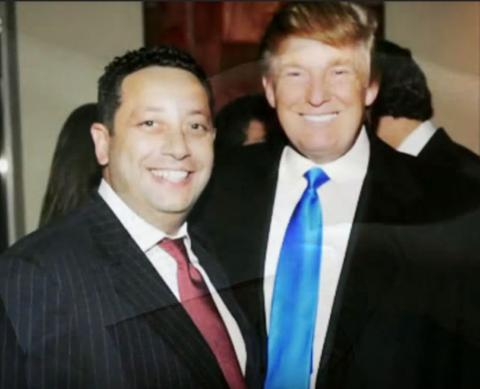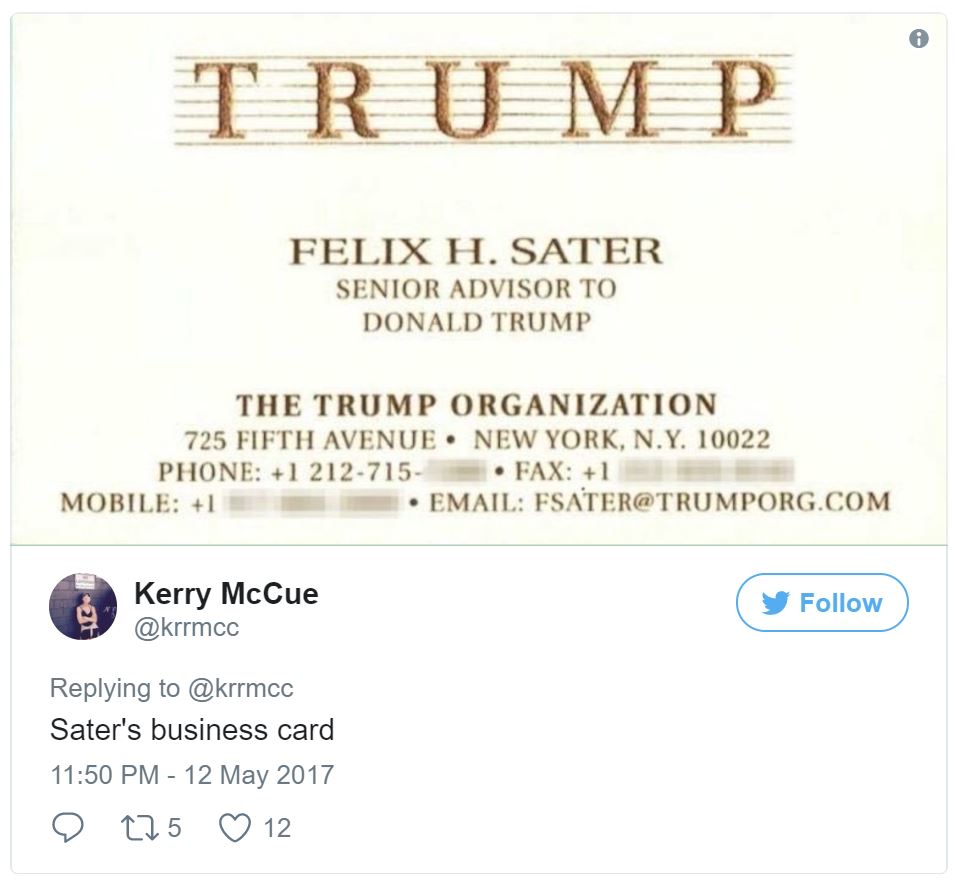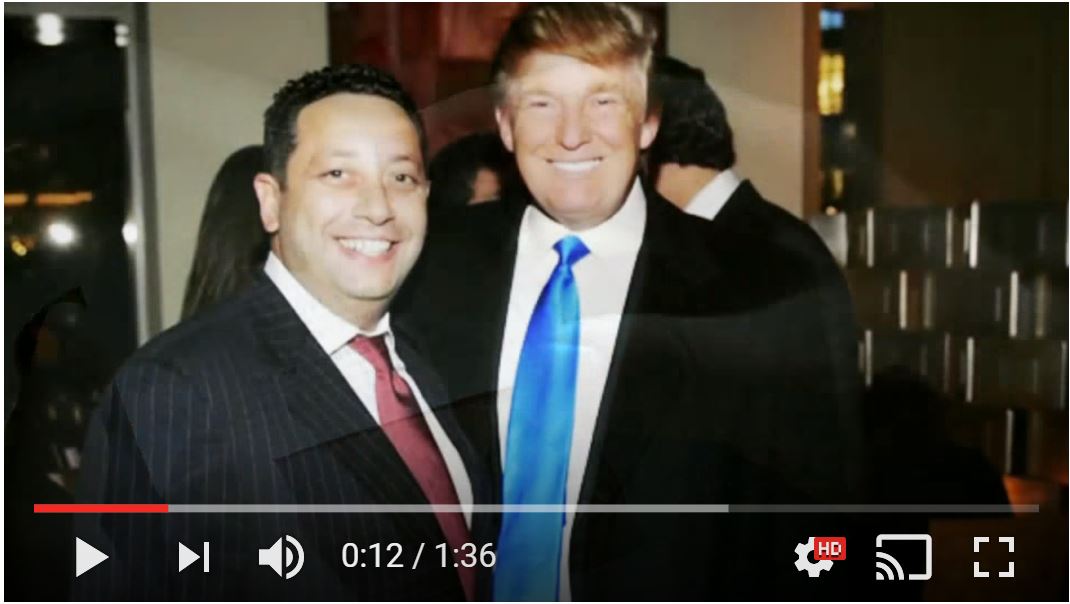Felix Sater Is Cooperating With a Money Laundering Investigation. That’s Bad News for Trump.
The Financial Times reported Thursday morning that Felix Sater, former business partner of President Donald Trump with deep ties to the Mafia and Russian government, is cooperating in an international investigation into an alleged money-laundering network. Sater has a history of channeling money from prominent families in the Eastern bloc into Trump properties. This could pose problems for Trump, given Sater’s history of outing former close associates in exchange for immunity.
According to recent reports from The New York Times and Bloomberg, these financial connections are also being investigated by special counsel Robert Mueller as part of the investigation into the Trump campaign’s possible collusion with Russia.
Sater is undoubtedly one of the more unsavory people the president has conducted business with. He was famously involved in a clash at a bar where he stabbed another man in the face with the stem of a martini glass, an assault that landed him in prison for a year. He pleaded guilty to racketeering as part of a $40 million stock fraud scheme orchestrated by the Mafia but avoided jail time by becoming a valuable federal informant for the FBI and CIA. Andrew Weissmann, the prosecutor who negotiated that plea deal, has been hired by Robert Mueller.
Then-U.S. Attorney for the Eastern District of New York Loretta Lynch said in a letter to Sen. Orrin Hatch during her confirmation as Barack Obama’s Attorney General that Sater provided “information crucial to national security and the conviction of over 20 individuals, including those responsible for committing massive financial fraud and members of La Cosa Nostra.”
In 2002, Sater reinvented himself, working at a real estate development firm called Bayrock Group. Bayrock’s offices are conveniently located on the 24th floor of Trump Tower in New York, which is where the paths of Sater and Trump cross. In a 2008 sworn deposition Sater said he would pitch Trump business deals (“just me and him”) on a “constant basis.”
By around 2005, Trump began licensing his name for real estate developments in New York and Florida. He struck up an exclusive deal with Bayrock to develop a property in Russia, a deal which later fell through while the others remained.
The same 2008 deposition reveals more of the casual nature of the business relationship between Sater and Trump. Sater says he would “pop head into Mr. Trump’s office” to tell him how the Russia deal was coming along. According to Sater, Trump asked him to escort Donald Jr. and Ivanka Trump during their 2006 trip to Moscow.
Looming in the background of all this, however, is Sater’s murky and checkered past. In 2007, Bayrock Group became a partner in Trump’s SoHo property. The property offering plan to New York State says that there were “no prior felony convictions of Sponsor , or any principals of Sponsor.” In December of 2007, The New York Times ran an article unearthing Sater’s criminal history. Two days later, Trump was deposed in a lawsuit. He stated multiple times that he had “very little” interaction with Sater. Despite this, in 2010 Sater toted around a business card that read he was a “senior adviser” at the Trump Organization.
Trump has stated repeatedly that he doesn’t know who Sater is and denied any meaningful relationship, maintaining that all deals were done directly with Bayrock, not Sater (who was employed by Bayrock.) In a 2013 deposition tape for a lawsuit about alleged fraud in a Fort Lauderdale condo Sater helped develop, Trump said he wouldn’t recognize Sater if he were sitting in the same room with him.
When asked in a 2013 BBC Panorama interview about why Trump remained in a deal with Sater considering his past with the Mafia, Trump walked off set.
Trump has a troubling pattern of distancing himself from close associates, whether it be a business deal or a presidential campaign, as soon as their dark history is revealed to the public.
Take for example Carter Page, the investment banker who had a brief stint as a foreign policy adviser on the Trump campaign. Page had traveled multiple times to Russia, met with Russian Ambassador Sergey Kislyak, and often spoke favorably of the Russian government and called for warmer U.S.-Russia relations.
As soon as reports came out in September of 2016 that U.S. investigators were looking into Page’s potential ties to the Russian government, the Trump campaign distanced themselves from Page. Kellyanne Conway appeared on CNN and said that he was “certainly not involved” in the campaign she was running, despite Page being one of the first national security advisors on the Trump team. In late September Page announced he would be taking a “leave of absence” from the campaign.
Although Trump attempted to distance himself from Page, last spring, when many foreign policy experts wanted nothing to do with the Trump campaign, Trump volunteered Page’s name when asked who had advised him on the topic.
This distancing also occurred when former campaign manager Paul Manafort and former national security adviser Michael Flynn were scrutinized for their undisclosed relationships with Russian officials. In a press conference, White House press secretary Sean Spicer even went so far as to say Manafort played a “very limited role” in the campaign while Flynn was just a “volunteer.”
Trump’s connections with Russia continue to haunt him despite his attempts to dismiss the story. A NPR/PBS NewsHour/Marist poll released Thursday morning found that a majority of Americans believe that Trump either acted illegally or unethically with Russia.
Rebekah Entralgo is a reporter @thinkprogress. Follow. Formerly: @NPR. David Farenthold once called me ageist.




Spread the word